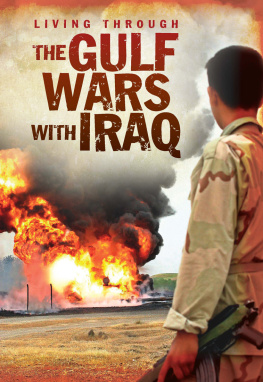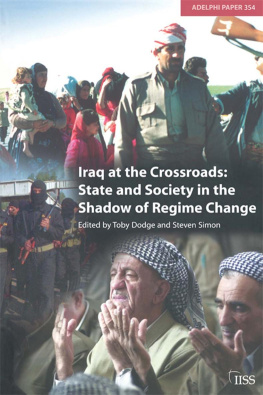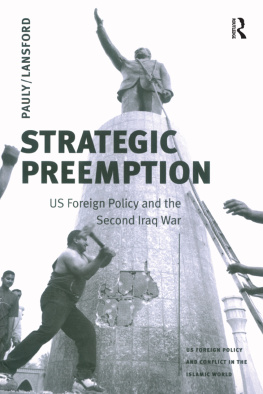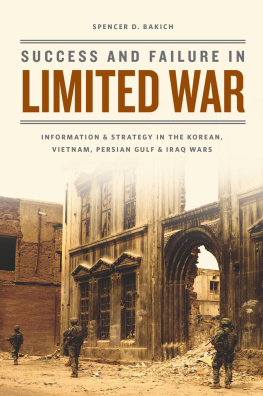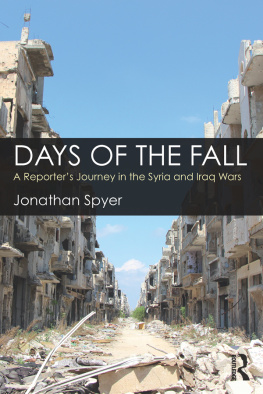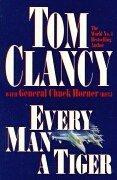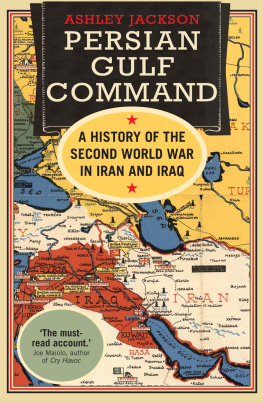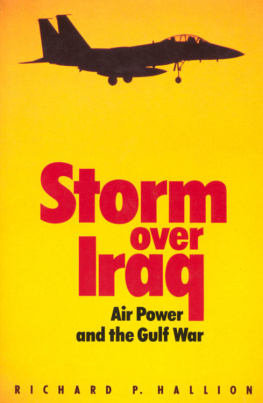Jane Bingham - The Gulf Wars with Iraq
Here you can read online Jane Bingham - The Gulf Wars with Iraq full text of the book (entire story) in english for free. Download pdf and epub, get meaning, cover and reviews about this ebook. year: 2012, publisher: Capstone, genre: History. Description of the work, (preface) as well as reviews are available. Best literature library LitArk.com created for fans of good reading and offers a wide selection of genres:
Romance novel
Science fiction
Adventure
Detective
Science
History
Home and family
Prose
Art
Politics
Computer
Non-fiction
Religion
Business
Children
Humor
Choose a favorite category and find really read worthwhile books. Enjoy immersion in the world of imagination, feel the emotions of the characters or learn something new for yourself, make an fascinating discovery.
- Book:The Gulf Wars with Iraq
- Author:
- Publisher:Capstone
- Genre:
- Year:2012
- Rating:3 / 5
- Favourites:Add to favourites
- Your mark:
- 60
- 1
- 2
- 3
- 4
- 5
The Gulf Wars with Iraq: summary, description and annotation
We offer to read an annotation, description, summary or preface (depends on what the author of the book "The Gulf Wars with Iraq" wrote himself). If you haven't found the necessary information about the book — write in the comments, we will try to find it.
Why has the recent War in Iraq been so contentious, whereas the First Gulf War was supported by a broad coalition of nations? Why are they of such global significance? And how did the wars affect people on both sides of the conflict? This book seeks to re
Jane Bingham: author's other books
Who wrote The Gulf Wars with Iraq? Find out the surname, the name of the author of the book and a list of all author's works by series.
The Gulf Wars with Iraq — read online for free the complete book (whole text) full work
Below is the text of the book, divided by pages. System saving the place of the last page read, allows you to conveniently read the book "The Gulf Wars with Iraq" online for free, without having to search again every time where you left off. Put a bookmark, and you can go to the page where you finished reading at any time.
Font size:
Interval:
Bookmark:


1958 The Iraqi army seizes control of the country. The royal family is expelled andIraq becomes a republic.
1968 The Baath Party takes control in Iraq. General Ahmad Hassan al-Bakr is madepresident and Saddam Hussein deputy president.
April 1979 An Islamic revolution in Iran replaces the Shah (king) with the Shiacleric Ayatollah Khomeini.
July 1979 Saddam becomes president of Iraq.
September 1980 Iraqi troops invade Iran, starting the eight-year Iran-Iraq War.
1982 The United States removes Iraq from its list of State Sponsors of Terrorismand gives Saddam open support in the Iran-Iraq War.
1986 The Anfal campaign against the Kurds begins. It lasts three years.
March 1988 The Kurdish town of Halabja is attacked with chemical weapons.
August 1988 The Iran-Iraq War ends.
August 2, 1990 Iraq invades Kuwait. UN Resolution 660 condemns the invasion and demandsthat Iraqi troops withdraw from Kuwait.
August 6, 1990 Planning begins for Operation Desert Shield. UN Resolution 661 placesinternational trade sanctions on Iraq.
August 8, 1990 Saddam makes his cousin Ali Hassan al-Majid the governor of Kuwait.
November 1990 UN Resolution 678 gives Iraq a deadline of January 15, 1991, to withdrawfrom Kuwait.
January 16, 1991 Coalition forces launch a four-week-long bombing campaign over Kuwaitand Iraq.
January 29, 1991 The battle of Al Khafji is fought in Saudi Arabia. It is a victoryfor the Coalition.
February 24, 1991 The Coalition ground campaign, code named Operation Desert Sabre,begins.
February 27, 1991 Saddam orders a retreat from Kuwait City. The retreating Iraqitroops are heavily bombarded by Coalition forces.
February 28, 1991 President Bush orders a cease-fire. The First Gulf War ends.
1992 Operation Southern Watch is put into place, with a no-fly zone for Iraqi planesestablished over south Iraq.
1993 U.S. forces launch a missile attack on Baghdad following claims that Saddamhad plotted to assassinate President Bush.
October 1995 Saddam wins a referendum allowing him to remain as president for anotherseven years.
August 1996 Iraqi forces invade the Kurdish regions of northern Iraq. U.S. forcesrespond by launching Operation Desert Strike.
December 1996 The UN puts into operation an Oil for Food program in an attemptto ease the economic problems in Iraq.
October 1998 Iraq ends cooperation with UNSCOM weapons inspectors.
December 1998 The United States and the United Kingdom launch Operation Desert Fox,with the aim of destroying Iraqs WMD programs.
1999 The UN creates UNMOVIC to replace UNSCOM.
February 2001 The United States and United Kingdom launch bombing raids to try todisable Iraqs air defense network.
September 11, 2001 Terrorists attack the World Trade Centers twin towers in NewYork City and the Pentagon in Washington, D.C.
October 2001 Coalition forces, led by the United States and the United Kingdom, goto war with Afghanistan.
September 2002 U.S. President George W. Bush warns world leaders of the grave andgathering danger of Iraq. UK Prime Minister Tony Blair publishes a questionabledossier on Iraqs military capability.
October 2002 The U.S. government authorizes the use of U.S. forces against Iraq.
November 2002 UN weapons inspectors, led by Hans Blix, return to Iraq.
January 2003 Public protests against war in Iraq are held in Western countries.
February 2003 U.S. Secretary of State Colin Powell presents evidence to the UN thatIraq is producing WMDs.
March 7, 2003 Hans Blix reports that he needs more time in Iraq.
March 17, 2003 UN weapons inspectors leave Iraq. Bush gives Saddam and his sons 48hours to leave Iraq or face war.
March 19, 2003 Bush makes an official declaration of war.
March 20, 2003 The Coalition invasion of Iraq begins.
April 9, 2003 Coalition troops gain control of Baghdad.
May 2003 A U.S.-led temporary administration is set up in Iraq and UN trade sanctionsare lifted.
July 2003 Saddams sons, Uday and Qusay, are killed in a gun battle.
October 2003 The Ramadan Offensive is launched by insurgents. The Iraq Survey Groupreports that it has found no WMDs and no viable WMD program.
December 2003 Saddam is captured by U.S. troops.
March 2004 Suicide bombers attack Shia festivals in Karbala and Baghdad.
April 2004 First Battle of Fallujah, a month-long U.S. siege of the city. Photosare published of Abu Ghraib prison, showing abuses of Iraqi prisoners by U.S. troops.
November 2004 Second Battle of Fallujah. It lasts for 46 days and ends in a U.S.victory.
January 2005 Elections are held for an Iraqi Transitional National Assembly.
December 2005 Elections are held for an Iraqi government and parliament.
February 2006 Violence between Sunnis and Shias erupts following the bombing ofthe al-Askari Mosque in Samarra.
December 2006 Saddam Hussein is executed for crimes against humanity.
January 2007 Bushs surge strategy sends 20,000 more troops to Iraq.
2007 The United Kingdom hands over security of the southern province of Basra toIraqi forces.
2008 The United States hands over control of the western province of Anbar to theIraqi government.
2009 U.S. President Barack Obama announces the withdrawal of U.S. combat troops bythe end of August 2010.
July 2009 A majority of UK troops leaves Iraq.
January 2010 Ali Hassan al-Majid, (Chemical Ali) is executed.
August 2010 The last U.S. combat unit leaves Iraq. Operation Iraqi Freedom ends,and Operation New Dawn begins. This aims to complete the process of training, equipping,and advising the Iraqi army.
October 2010 The website Wikileaks publishes secret documents on the Iraq War.
February 2011 Rafid Ahmed Alwan al-Janabi (code name Curveball) admits that evidencehe supplied to the Coalition for the existence of WMDs was false.
May 2011 The last UK troops, who were training the Iraqi navy, leave Iraq.
Saddams Iraq (pages 613)
.Accessed on February 20, 2011.
Oil in Iraq: The Byzantine Beginnings, Global Policy Forum . Accessed on April3, 2011.
.Accessed on February 20, 2011.
. Accessed on February 20, 2011.
Ibid.
Saddam Hussein, Encyclopdia Britannica .
Jean Sasson, Mayada: Daughter of Iraq (New York: Dutton, 2003).
Zainab Salbi and Laurie Becklund, Hidden in Plain Sight, Growing Up in the Shadowof Saddam (London: Vision, 2005).
John Simpson, The Wars Against Saddam: Taking the Hard Road to Baghdad (London:Macmillan, 2003), 51.
. Accessedon February 20, 2011.
War and Tyranny (pages 1419)
.Accessed April 3, 2011.
.Accessed on April 3, 2011.
.Accessed on February 20, 2011.
. Accessed on February 20, 2011.
Western Support 1980-88: Iran-Iraq War 1980-1988, BBC News.
.Accessed on February 20, 2011.
. Accessedon February 20, 2011.
Accessed on February 20, 2011.
.Accessed on July 8, 2011.
John Simpson, The Wars Against Saddam , 83-88.
Genocide in Iraq: The Anfal Campaign Against the Kurds, Introduction.
Invading Kuwait (pages 2027)
Iran-Iraq War, Encyclopdia Britannica.
.Accessed on February 20, 2011.
Iran-Iran War 19801988, BBC News .
John Keegan, The Iraq War: The 21 Day Conflict and its Aftermath (London: Pimlico,2004), 69.
.Accessed on February 20, 2011.
Ibid.
Font size:
Interval:
Bookmark:
Similar books «The Gulf Wars with Iraq»
Look at similar books to The Gulf Wars with Iraq. We have selected literature similar in name and meaning in the hope of providing readers with more options to find new, interesting, not yet read works.
Discussion, reviews of the book The Gulf Wars with Iraq and just readers' own opinions. Leave your comments, write what you think about the work, its meaning or the main characters. Specify what exactly you liked and what you didn't like, and why you think so.

